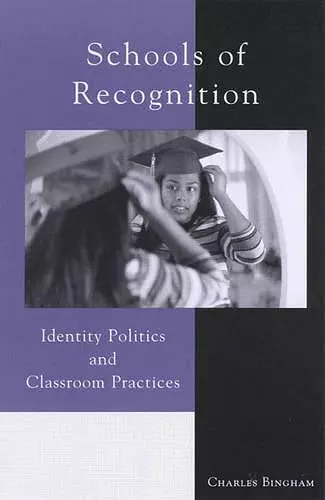Schools of Recognition
Identity Politics and Classroom Practices
Format:Paperback
Publisher:Rowman & Littlefield
Published:11th Apr '01
Currently unavailable, and unfortunately no date known when it will be back

Schools are places where various cultures and identities must be recognized, yet there has been little research into what it means to recognize another person, identity, or culture. Drawing on the writings of Charles Taylor, Martin Buber, Judith Butler, and Jessica Benjamin, Schools of Recognition provides a rich picture of how recognition is negotiated in education. Using political theory, existentialism, queer theory, and psychoanalysis, Bingham shows that recognition can be fostered not only through the books that students read, but also through the ways that they learn to engage with other human beings. Recognition depends not only on receiving acknowledgement, but also on giving acknowledgement. It depends not only on what we learn from others about ourselves, but also on what we are able to teach others about themselves.
This is a provocative and important book that will give educators a way to talk about how we can help students develop their own voices and be recognized in the classroom. Using narrative and philosophical analysis, Charles Bingham weaves a carefully considered and personally connected introduction to recognition theory for educators. This is not an argument for the best framework of recognition, but rather an introduction to multiple perspectives, bringing out their strengths and weaknesses. The reader will become familiar with various iterations and become more adept at using them as tools to help analyze the problems educators face in our everyday efforts to value and appreciate our diverse students. -- Barbara J. Thayer-Bacon, University of Tennessee
This book is well worth reading. The philosophical questions are substantive, the theory base is sound, and the argument is thoughtfully constructed. This work is valuable for both research and teaching. * Anthropology & Education Quarterly *
A useful, scholarly, thought-provoking text. The author enables a series of conceptual and practical insights to emerge. * Educational Review *
Paulo Freire addressed the politics of recognition when he said, 'For me to know, I need another subject of knowing. . . . Because of you, I know I can know more.' Education scholars have yet to consider adequately the profound pedagogical importance ofrecognition. Charles Bingham's new book is a bold new attempt to conceptually energize this often neglected topic. In doing so, he makes an enlivening case for why recognition has to become a critical theme in teacher education, and why we need critical politics of recognition in the classrooms of the nation. Bingham's book teaches us a great deal about the history behind the self's need for recognition. It is persuasive in its claim that educators need to undress the representational categories of recognition and increase the potential for subversive resignification as well as for forging a collective, enfleshed, recognitive agency. Schools of Recognition deserves our recognition. -- Peter McLaren, Honorary Chair Professor and Director of the Center for Critical Studies, Northeast Normal University, China
Paulo Freire addressed the politics of recognition when he said, 'For me to know, I need another subject of knowing. . . . Because of you, I know I can know more.' Education scholars have yet to consider adequately the profound pedagogical importance of recognition. Charles Bingham's new book is a bold new attempt to conceptually energize this often neglected topic. In doing so, he makes an enlivening case for why recognition has to become a critical theme in teacher education, and why we need critical politics of recognition in the classrooms of the nation. Bingham's book teaches us a great deal about the history behind the self's need for recognition. It is persuasive in its claim that educators need to undress the representational categories of recognition and increase the potential for subversive resignification as well as for forging a collective, enfleshed, recognitive agency. Schools of Recognition deserves our recognition. -- Peter McLaren, Honorary Chair Professor and Director of the Center for Critical Studies, Northeast Normal University, China
ISBN: 9780742501966
Dimensions: 230mm x 146mm x 13mm
Weight: 263g
176 pages